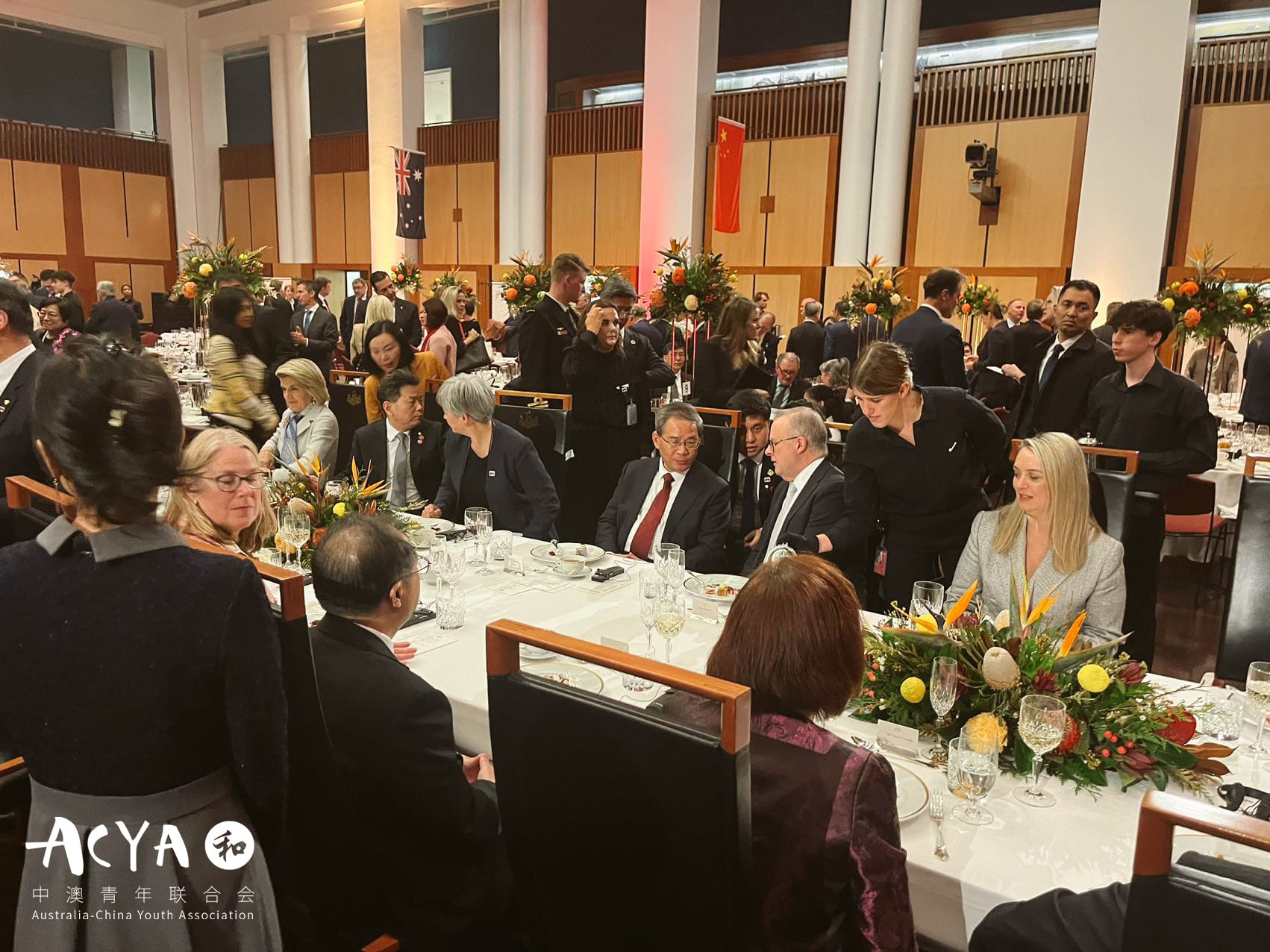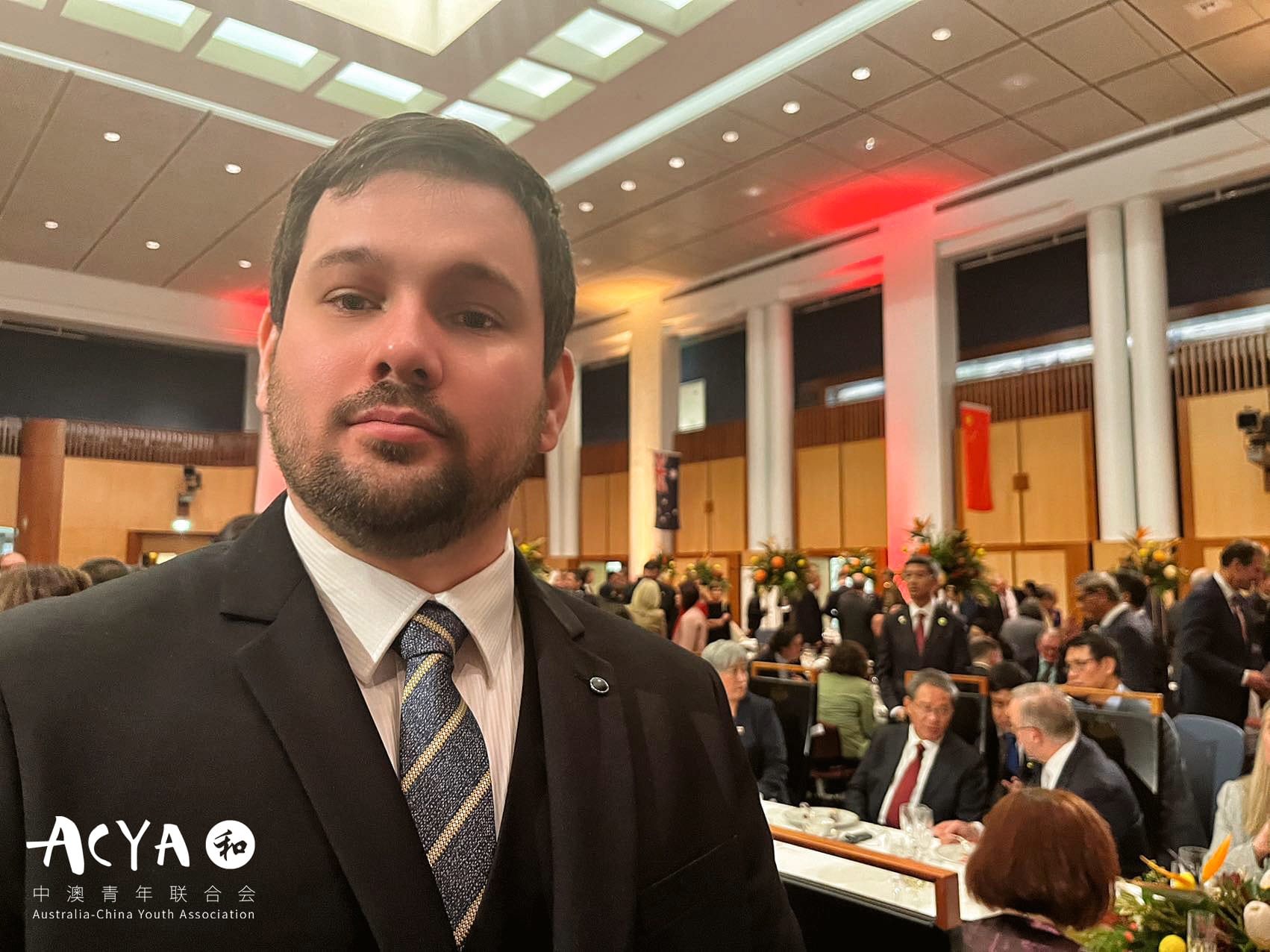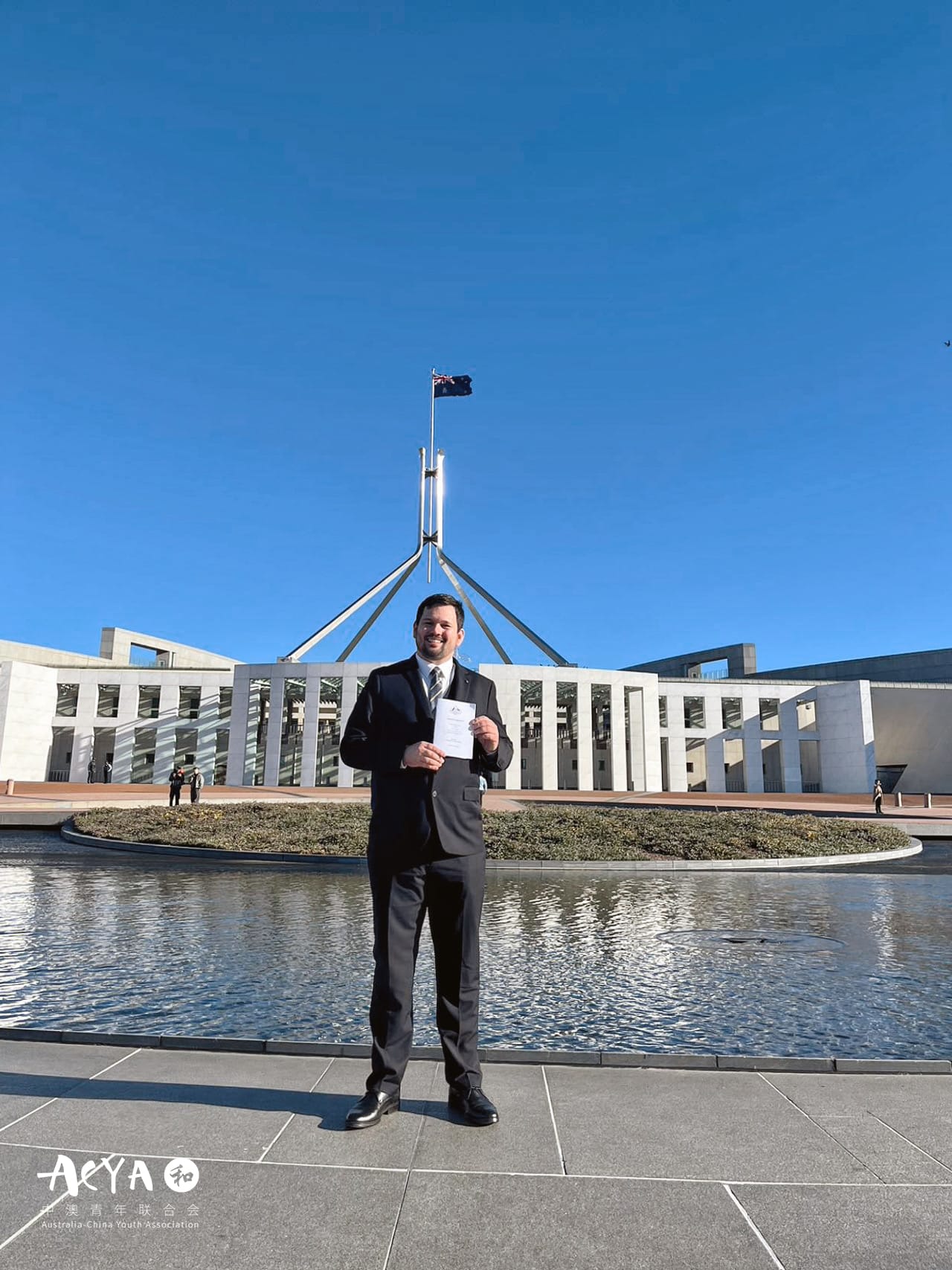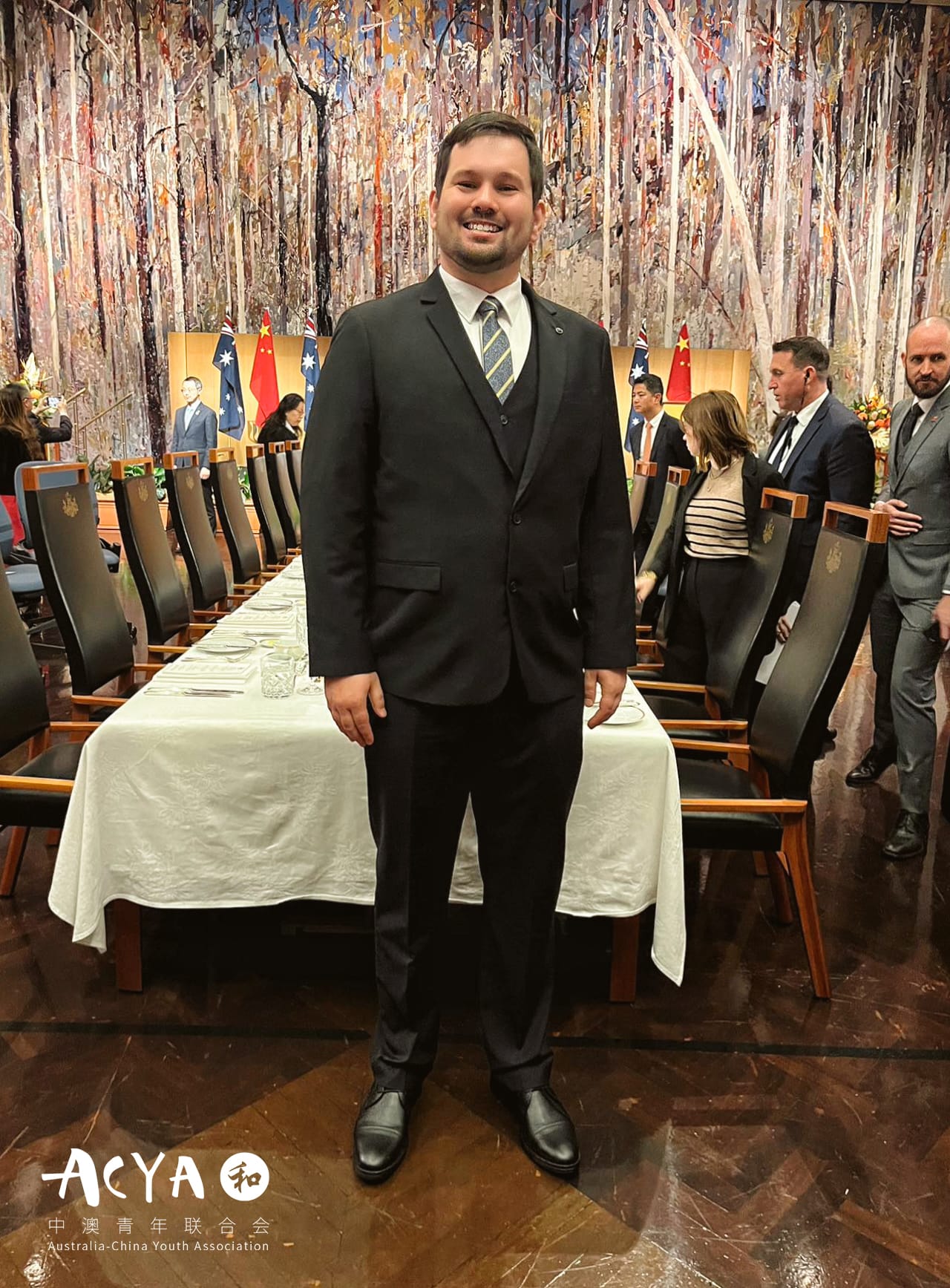Not a 'China Expert,' But a Humble Learner: Special Interview with Mackenzie Lang
Mackenzie shares his feelings as an invitee to this significant diplomatic event.

China’s Premier, Li Qiang, arrived in Australia on Saturday, 15th June for a four-day visit that included stops in Adelaide, Canberra and Perth.
MacKenzie Lang, National President of the Australia-China Youth Association (ACYA), was invited to The Official State Luncheon in The Parliament House of Australia on 17th June.
ACYA Publication Director made hay by leading the interview with Mackenzie. In this interview, Mackenzie shares his feelings as an invitee to this significant diplomatic event. He also discusses his interests and initiatives in bilateral relations between China and Australia, including the origin of his Chinese name and his perspective on the Australia-China relations.

- What was your feeling as an invitee of the official State luncheon in The Parliament House of Australia on 17th June?
Honestly, I didn’t believe it at first, I had to email ACYA’s sponsor at the Department of Foreign Affairs and Trade to confirm it was real! I then had to move quickly to secure time off from work, book flights, and accommodation, and make sure I could arrive on time. For a lot of the invitees I spoke to it was similar, a somewhat last-minute notification that they couldn’t turn down.
I’ve always been passionate about the Australian relationship with China and the role ACYA plays in it. To have that recognised and to be part of that recognition is one of the highest honours I have achieved.
- Can you share us with some exciting moments of the event?
The most exciting moment was definitely the moment the Australian Prime Minister Anthony Albanese, Chinese Premier Li Qiang, and other senior leaders entered the room. It’s one thing to see on TV. But in person with the band playing and everyone standing in respect, it felt momentous. I wonder what it’s like to have that happen to you in every room you enter. Would you start to ignore it or even get annoyed or would it always remind you of how much trust and respect is placed in your office?
I wondered what they had said beforehand as I watched them enter. Had the introductions gone well? Were they finding common ground or struggling with the language barrier? How would further talks go? I didn’t really have an answer to these questions until much later, but the accomplishments of the delegation spoke for themselves.
- Obviously, you are a witness to the huge leap in bilateral relations between China and Australia. What is your feeling at the time as the Chair of ACYA?
It is always important to have dialogue but at the same time, I see far too much work left in promoting Australia-China relations. I mean, this can’t be the peak of our relationship, can it? It’s good to see more trade and easier travel, but we still need to pursue new trade opportunities and more people-to-people exchanges.
Australia and China are natural partners due to our economies and long history of migration and have a common destiny as Asia-Pacific nations. But there remains a trust deficit – some of the coverage of Premier Li’s visit was far from positive on the Australian side, with media focusing on criticism of China rather than what was accomplished. We have to do more and that won’t be easy, but we can’t let the effort for better Australia-China relations falter.
- We want to dig out more about your interests and initiatives in bilateral relations between China and Australia. What drives you to take a deep dive into Chinese culture? When did you start this? Can you tell your story?
It feels like a lifetime ago but it’s also a daily process.
I suppose it all started back in grade 8 when Chinese language was one of the electives we trialled. Later on, we got to pick three to four of those electives to keep. I knew I wanted to study a language and Mandarin and Italian were the two offered. I’ll sometimes joke about how I would be sipping coffee in Milan if I had chosen differently but in all seriousness, my life would be the poorer if I had gone that way. I took my first trip to China in grade 11 with my family and second in grade 12 with the class exchange.
After graduating - well I was a weak student truth be told, but I needed an elective, and Chinese seemed the natural pick. Mandarin is the language of the future after all. I got to visit again including a short summer exchange to Sichuan.
To me the more I learn the more ignorant I am. I’m far from fluent, far from able to catch every cultural reference or to analyse every policy. There’s too much to learn in every way. The more I experience China the more I am humbled. There’s nothing I dislike more than the term “China Expert”. It’s an absurd label indicative of a major Dunning-Kruger effect. I mean China’s geography alone is unparalleled in its diversity. Could a person claim to be an expert in that, let alone the economy, history, and politics?

- Many who have studied or lived in China for a long period have their Chinese names. I noticed that your Chinese name is 朗玛昆. Are there any stories behind your Chinese Name? Why did you pick these 3 characters as your name?
Thank you for asking! 玛昆 (Mǎ Kūn) is the name that was given to me by my middle and high school Chinese teacher Byron 老师. 昆 (Kūn) is the first character for my home state of Queensland and 玛昆 aligns well with the pronunciation of my birth name of Mackenzie. It was in Ms Byron’s class that I had the opportunity to learn Chinese and to go on the school China tour. I am very grateful that she started me on my journey to involvement in the Australia-China relations!
My family name is German, with some branches of my family going by Lang and others by Lange due to anglicisation. I go by the original form of Lang and when I realised it had the same letters as one of the Hundred Family Surnames 百家姓 (Bǎi Jiā Xìng). Thus I chose to use 郎 (Láng) for my Chinese name. A happy coincidence although more than a few people have made some mistaken assumptions about my heritage as a result.

- From which perspectives do you think that ACYA can contribute to the healthy relations between China and Australia?
ACYA’s primary goal and purpose is to promote the personal experience of the two countries among youth, whether in career or learning or personal travel and culture.
The problem right now is that people have no real context for what life in the other country is like. International travel restrictions were necessary to address COVID, but they’ve also left a vacuum where anyone can say anything because people lack personal experience to discern truth from falsehood. If you don’t know anyone from a country or have never been there, it’s pretty hard to tell the experts from the shysters. The Australia-China relationship is too important to let liars dominate the discourse.
ACYA plays a vital role in helping young people from both countries meet each other and put a face to stories. We will continue to support international and exchange students and promote cultural understanding and career opportunities. We hope that by our efforts in ACYA, more people can get first or at least second-hand experience. That’s our duty and that’s our role. ACYA will continue to grow and continue to work in this space to share constructive and productive information as widely as possible. I am delighted to see this newsletter reopen after many years. It will play a crucial role in showcasing the achievements of our community to as wide an audience as possible. We need people like you Bob, Joseph, and Meryl, and our translations director, Jiacheng, to share stories that humanise this relationship.
